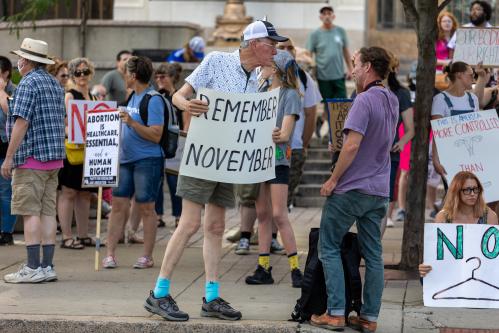

12:30 pm EDT - 1:00 pm EDT
Past Event
12:30 pm - 1:00 pm EDT
1775 Massachusetts Ave., NW
Washington, DC
After the Supreme Court’s recent decision to uphold Obamacare and the individual mandate, it’s time for the states to implement the law. But by striking down provisions that require states to expand Medicaid eligibility, for example, the Court’s ruling raises important questions about the future of health care in America.
How will the Court’s decision affect states’ implementation of the law? What changes can we expect in massive programs like Medicare and Medicaid? On July 11, Brookings expert Tracy Gordon took your questions and comments in a live web chat moderated by Emily Howell of POLITICO.
12:29 Emily Howell: Welcome everyone, let’s get started.
12:30 Tracy Gordon: Hi everyone. Great to be here today. Let’s talk Medicaid and state budgets!
12:31 Comment From Gail: How unexpected was the idea that Medicaid provision was deemed “coercion?” In the leadup to the decision, it seemed as though experts expected the Court to rule that the provision, as it was written, merely encouraged states to follow a federal law.
12:34 Tracy Gordon: It was really unexpected! Some court watchers – including my esteemed colleague Henry Aaron – called Medicaid the “sleeper issue” of the case, but a lot of people in my world of state budgets and federalism were very surprised.
The federal government has a long history of conditioning aid on its rules and even the enabling legislation of Medicaid says that Congress reserves the right to “amend, repeal, or alter” any provision.
The court basically said this time was different because Medicaid had growth so large and was such a big part of state budgets.
12:34 Comment From Bryan, DC: It seems completely illogical to me that states would reject the Medicaid expansion, which comes with significant federal help. By doing so, are they just playing politics?
12:35 Tracy Gordon: Some people definitely think so, and bear in mind that declarations now don’t mean a whole lot. The law is scheduled to go into effect in 2014 so governors have some time to mull it. As Gov. Christie said here at Brookings on Monday, it will be part of his FY2014 deliberations.
12:36 Comment From John, CA: By choosing to opt out of the medicaid expansion, will states lose money in the long run? As in – is there any validity to the idea that participating in the expansion is “too expensive?”
12:38 Tracy Gordon: The federal government picks up the whole tab in 2014. Then their share gradually declines to 90 percent and the legislation says it remains there after 2020. Some people might remember the Senator Nelson “cornhusker deal” where he tried to get a good deal for Nebraska. In the end, *all states* got the deal basically. It’s a very generous subsidy.
12:39 Tracy Gordon: However, the issue from the state perspective is that they have to find that extra 10 percent somewhere. And they are feeling pinched in other areas and they are expected to balance their budgets each year.
12:40 Tracy Gordon: Plus, there is a concern that while the feds are on the hook for people who would be newly eligible for Medicaid (because they are under 138 percent of the federal poverty line) there might be other people who were previously eligible but not enrolled who would “come out of the woodwork” when they saw all the PR etc. States would have to pay for these people and it’s not clear if they are high or low cost.
12:41 Comment From Sarah: What benefits will states experience for choosing to participate in the ACA Medicaid expansion?
12:43 Tracy Gordon: A benefit is that their residents who were previously uninsured will have coverage. This will be especially attractive when scheduled cuts to federal payments for uncompensated care go into effect. So some people think that hospitals and other health providers will pressure governors to say yes if uninsured people start showing up for care and that pot of money has dried up, while at the same time there’s a new pot of money governors aren’t accessing.
12:44 Comment From Jessie in Rockville: Will the initial subsidies offered by the ACA expansion be offered in perpetuity? Are they set to expire at any time?
12:46 Tracy Gordon: This is the big uncertainty for states. As I said above, they are supposed to last in perpetuity after 2020, but there’s no guarantee. Then again, the federal government can change the regular matching rate for Medicaid and any other grant program for that matter whenever it wants too. I don’t see how it could ever be an iron clad promise.
12:48 Tracy Gordon: By the way, another source of uncertainty is what the feds will do about subsidies to individuals and families so that they can purchase insurance on the exchanges. I don’t think anyone really envisioned that the Medicaid expansion would be stripped from the original program so there is some reporting that HHS is now trying to figure out what to do. One line of thought is that they will expand subsidies to get people below the poverty line covered.
12:48 Comment From Guest: Once we start to see states implementing the expansion, can we expect voters in states that rejected the expansion to feel cheated? Do you think there will be political backlash toward the governors that said “no thanks”?
12:50 Tracy Gordon: I think it will be very hard to say no to a free program for the worst off among the uninsured even if it means that the state will be on the hook for 10 percent of the costs later. Then again, a lot of states held out for a long time before expanding their children’s health programs in the 1990s and before taking up Medicaid in the first place (Arizona famously waited until 1982 when the Medicaid law passed in 1965).
12:51 Comment From Margaret: Six governors have declared that they won’t accept the Medicaid expansion, but as you mentioned earlier these declarations don’t mean much now. Which states are most likely not to accept the expansion?
12:51 Comment From Michael MA: Looking at individual states – do you know of any that would particularly benefit from participating in the expansion? Or, more broadly, what characteristics of a state’s budget make it an excellent candidate for participating in a way that is beneficial to their budget?
12:54 Tracy Gordon: It’s so hard to game it now and figure out what will happen in the future. As a lot of you have said, some of this is politics and some is dollars and cents. The name of the game in state budgets is always variation. I tried to examine in my blog today which states stood to benefit from refusing the expansion based on the proportion of (relatively) high income uninsured in their states. But if the rules change, this calculus could change again.
12:54 Comment From Mark: Wait – you said that it’s not clear if people who “come out of the woodwork” would be high or low cost Medicaid recipients? Is this really in question? If someone was eligible for Medicaid under the criteria in place before the expansion but didn’t enroll until after the expansion… I thought their benefits would clearly NOT be covered at the higher (90%) federal rate.
12:55 Tracy Gordon: Yes, they clearly would not get the 90% match, but we don’t know if they are older and sicker and younger and healthier.
12:55 Comment From User in Vermont: Do you expect, over time, for the expansion to become universally popular? Obviously it’s politically divisive among the states now. But do you think that, twenty years down the road, participating in it will be a no brainer?
12:58 Tracy Gordon: Looking twenty years down the road, I see a wave of rising health care costs and aging populations that will clobber both federal and state budgets if we don’t get out in front of it. I think that’s why it may be in state interests to expand Medicaid rather than having sick people show up in emergency rooms, etc. But in twenty years, we could also be talking about a radically different Medicaid program including block grants to states or the feds taking the most expensive recipients (elderly and disabled) off state hands. Stay tuned for Medicaid to be part of the talk on any “grand bargain” on federal deficit reduction.
12:59 Tracy Gordon: I think that’s about all the time we have for now. Thanks so much for the great questions.
12:59 Emily Howell: Thanks for the questions!
Related Content

Tracy Gordon
July 11, 2012

Tracy Gordon
July 2, 2012
12:30 pm - 1:00 pm
How will the Supreme Court’s decision affect states’ implementation of the health care law? What changes can we expect in massive programs like Medicare and Medicaid? On July 11, Brookings expert Tracy Gordon took your questions and comments in a live web chat moderated by Emily Howell of POLITICO.

Elaine Kamarck, Celia Shapiro
September 15, 2022

Matthew Fiedler
July 19, 2022

Vanessa Williamson, John Hudak
May 9, 2022